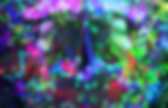

The Journal of Neuroscience. Neuroscience. Neuroscience is the scientific study of the nervous system.[1] Traditionally, neuroscience has been seen as a branch of biology.
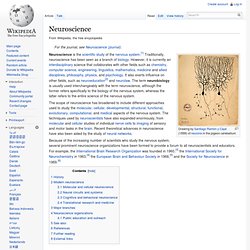
However, it is currently an interdisciplinary science that collaborates with other fields such as chemistry, computer science, engineering, linguistics, mathematics, medicine and allied disciplines, philosophy, physics, and psychology. It also exerts influence on other fields, such as neuroeducation[2] and neurolaw. Society for Neuroscience. Allen Institute for Brain Science: Home. Team Reveals How the Brain Recognizes Speech Sounds. UC San Francisco researchers are reporting a detailed account of how speech sounds are identified by the human brain, offering an unprecedented insight into the basis of human language.

The finding, they said, may add to our understanding of language disorders, including dyslexia. Scientists have known for some time the location in the brain where speech sounds are interpreted, but little has been discovered about how this process works. Now, in the Jan. 30 edition of Science Express, the fast-tracked online version of the journal Science, the UCSF team reports that the brain does not respond to the individual sound segments known as phonemes – such as the b sound in “boy” – but is instead exquisitely tuned to detect simpler elements, which are known to linguists as “features.”
The work may add to our understanding of reading disorders, in which printed words are imperfectly mapped onto speech sounds. Breaking Down Speech into Acoustic Features How Does Your Brain Process Spoken Words? Neuroscience-Net Books, Journal, & Forums. Neuroscience Information Framework. Category:Neuroscience. Neuroscience is a field of study which deals with the structure, development, genetics, biochemistry, physiology, pharmacology and pathology of the nervous system.
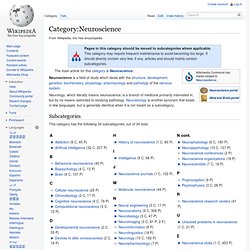
Neurology, which literally means neuroscience, is a branch of medicine primarily interested in, but by no means restricted to studying pathology. Neurobiology is another synonym that exists in few languages, but is generally identical when it is not meant as a subcategory. Subcategories This category has the following 34 subcategories, out of 34 total. Pages in category "Neuroscience" The following 200 pages are in this category, out of 353 total. (previous 200) (next 200)(previous 200) (next 200) The Many Fields of Neuroscience: Shifting from Synapses to Society.
Neuroscience has come a long way since the staining and identification of the neuron by Camillo Golgi and Ramón y Cajal over a century ago.
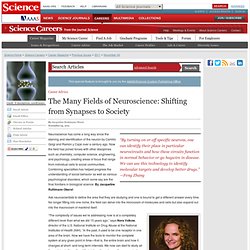
Now the field has joined forces with other disciplines such as chemistry, computer science, engineering, and psychology, creating areas of focus that range from individual cells to social communities. Combining specialties has helped progress the understanding of social behavior as well as various psychological disorders, which some say are the final frontiers in biological science. By Jacqueline Ruttimann Oberst Ask neuroscientists to define the area that they are studying and one is bound to get a different answer every time. No longer fitting into one niche, the field can delve into the microcosm of molecules and cells but also expand out into the macrocosm of mankind itself.
Credit: National Institute on Drug Abuse Nora D. Encyclopedia of computational neuroscience. List of unsolved problems in neuroscience. List of neuroscience databases. A number of online neuroscience databases are available which provide information regarding gene expression, neurons, macroscopic brain structure, and neurological or psychiatric disorders.
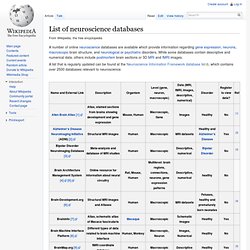
While some databases contain descriptive and numerical data, others include postmortem brain sections or 3D MRI and fMRI images. A list that is regularly updated can be found at the Neuroscience Information Framework database list, which contains over 2500 databases relevant to neuroscience. Other databases[edit] See also[edit] Neuroinformatics External links[edit] References[edit] Portal:Neuroscience.
History of Neuroscience. Etymology of Neuroscience Terms. Who's Who in Neuroscience. Neurotree: A Collaborative, Graphical Database of the Academic Genealogy of Neuroscience. Neurotree is an online database that documents the lineage of academic mentorship in neuroscience.
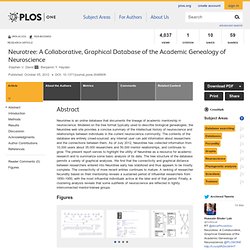
Modeled on the tree format typically used to describe biological genealogies, the Neurotree web site provides a concise summary of the intellectual history of neuroscience and relationships between individuals in the current neuroscience community. The contents of the database are entirely crowd-sourced: any internet user can add information about researchers and the connections between them. As of July 2012, Neurotree has collected information from 10,000 users about 35,000 researchers and 50,000 mentor relationships, and continues to grow. The present report serves to highlight the utility of Neurotree as a resource for academic research and to summarize some basic analysis of its data.
The tree structure of the database permits a variety of graphical analyses. Figures Editor: Luís A. Received: April 20, 2012; Accepted: September 6, 2012; Published: October 5, 2012 Introduction Methods. Neurotree. Welcome to Neurotree v1.0 - The Neuroscience Academic Family Tree What is Neurotree v1.0?
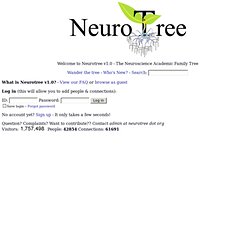
- View our FAQ or browse as guest Log in (this will allow you to add people & connections): No account yet? Sign up - It only takes a few seconds! Question?